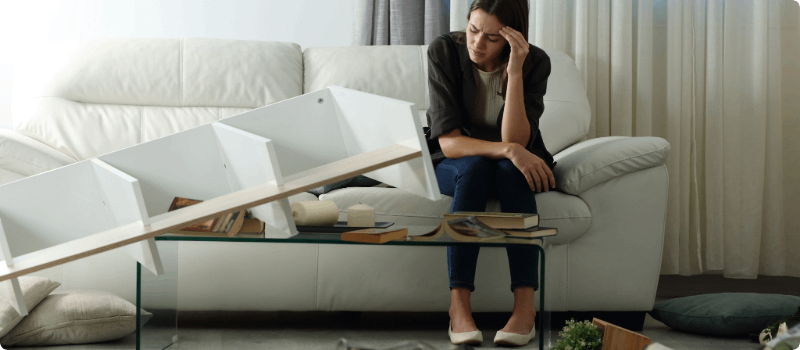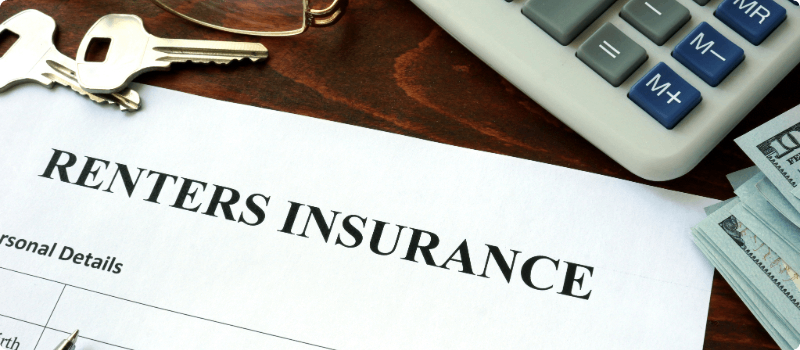Can landlords require renters insurance?
Updated July 22, 2020 . AmFam Team
You’re apartment hunting and finally find the one that has everything you’ve been looking for — and the landlord says it’s all yours. However, your landlord requires you to buy a renters insurance
policy to secure the lease. Can landlords do that?
The short answer is yes, they can. Landlords can mandate renters coverage because it helps to prevent disputes if a tenant’s personal property is damaged in the rental unit or on rental grounds. It also helps shield landlords from liability claims. Most importantly, renters insurance helps protect your savings — even if your landlord doesn’t make you buy a policy.
Let’s examine how renters insurance coverage may help protect you from expensive losses.
How does renters insurance benefit the tenant?
Because your landlord's insurance only covers their property and not yours, you’ll want to protect your belongings. That’s where renters insurance steps in. It helps protect from unexpected losses you in several ways:

Personal property coverage
You’ve worked hard for your belongings that make your home uniquely yours. You could lose a lot if your rental is broken into — from expensive electronics to high-priced jewelry. Under a covered event, your renters insurance may help pay for the replacement or repair of your valuables like:
- Bicycles
- Televisions and smart TV systems
- Computers
- Furniture
- Jewelry
You may be protected if your belongings are damaged by a covered loss. Better yet, your belongings are protected wherever you go. Learn more about renters insurance coverage that follows you.
Liability coverage
Say you’ve just mopped the floor, and your friend slips and falls, breaking their arm. Your landlord wouldn’t be responsible for the incident, but your renters insurance may be able to help. Depending on your insurer, you may be able to get coverage up to your policy limit for covered losses if you’re found legally liable for:
- Bodily injury lawsuits
- Damage done to the rental property
- Medical expenses when others are injured due to your negligence
Loss of use protection
If something happens to your building, such as a fire, and you must find temporary living arrangements, your landlord won’t foot the bill. But the loss of use portion of your renters policy can cover the following up to your policy's limits after a covered loss:
- The replacement of destroyed personal property
- Additional living expenses, such as a hotel
- Other qualifying expenses while you’re temporarily displaced

Why do landlords require renters insurance?
Though there’s no law forcing tenants to get renters insurance, your landlord may mandate coverage through a clause in your lease. If you sign a lease requiring renters insurance, you must get it.
Landlords require a renters insurance policy to reduce the financial risk tenants can pose to their rental property. These kinds of things include:
- The restoration and replacement of rental property you’ve broken or destroyed
- Your coverage can shield landlords from liability claims if someone's injured in your rental
- When rental agreements require renters insurance, landlords may be more likely to allow dogs
- By requiring rental coverage, landlords can better control their property insurance premiums
Actions you need to take when renters insurance is required
If your landlord has mandated that you get renters coverage, you’ll need to do the following:
- Get a quote for renters coverage
- Purchase a renters insurance policy
- Verify that your renters policy will be active across the start and stop dates in your lease
- Email or supply a hard copy of your policy to your landlord
Actions your landlord can take if you don’t get renters coverage
If you’re given a few weeks to pick up renters insurance and don’t do so, your landlord may follow provisions outlined in your lease, which could include:
- A fine
- An eviction warning
- Eviction
Before signing any lease, be sure to read through it and ask your landlord questions about renters insurance.

Why landlords require renters insurance
Landlords typically require renters insurance from their tenants to avoid liability lawsuits. Because most rental insurance includes liability coverage, your renters coverage may help protect the landlord from being sued if someone's injured in your rental.
Additionally, if a covered loss damages the property in your rental, having renters coverage may help you repair the rental to its previous condition. For example, suppose you accidentally leave your water on in the bathtub, and it overflows. Water then leaks into your neighbor's unit and ruins their personal property. Your landlord can hold you liable for those damages.
The landlord may also need you to pay for damages to the floor and drywall in the affected rental units. Whether damage was done to the neighbor’s personal property or the landlord's rental property, you’ll be financially responsible for them. Your coverage ensures funds are available for landlords if the unexpected happens.
Renters insurance benefits you and the landlord because it may help cover costs resulting from covered losses.
Does my landlord’s insurance cover my rental anyway?
You might think that the landlord’s insurance will cover your personal property in the event of theft or other damages, but that’s not true. Your landlord’s insurance only covers their building and any structural damage to their property — they aren’t responsible for any of your belongings.
Find out more about why landlords may require tenants to get renters insurance.
How much is renters insurance?
For the cost of one dinner out per month, you can typically get renters insurance that offers the coverage today’s landlords require. But the actual cost of your renters insurance depends on the coverage you choose. Your agent will build a policy and a quote based on the following details:
- The value of the items you store in your rental unit
- Your ZIP code
- Other optional coverages you opt for like identity theft protection, pet insurance, travel insurance or home business coverage
Connect with an American Family Insurance agent to talk about your renters insurance options — you’ll gain peace of mind that you’re protecting all the things that make your home uniquely yours.
This article is for informational purposes only and based on information that is widely available. We do not make any guarantees or promise any results based on this information. This information does not, and is not intended to, constitute legal advice. You should contact your attorney for legal advice specific to your situation.
This information represents only a brief description of potential coverages, is not part of your policy, and is not a promise or guarantee of coverage. If there is any conflict between this information and your policy, the provisions of the policy will prevail. Insurance policy terms and conditions may apply. Exclusions may apply to policies, endorsements, or riders. Coverage may vary by state and may be subject to change. Some products are not available in every state. Please read your policy and contact your agent for assistance.

